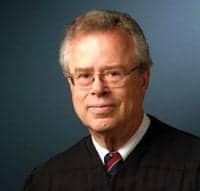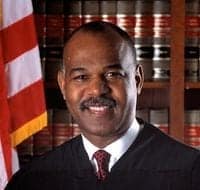The Fourth Circuit panel consists of Paul V. Niemeyer (below, left), nominated to the court in 1990 by President George H.W. Bush; Roger L. Gregory (below, center), nominated by both Presidents Bill Clinton and George W. Bush; and Henry F. Floyd (below, right), nominated as a district judge by George W. Bush in 2003 and named to the appeals court by President Obama in 2011. Not that any of that really matters. We have seen many Republican-appointed judges strike down bans on same-sex marriage with rhetorical flourishes and strong statements of equality.
But sometimes, party matters. In this case, the new Democratic administration in Virginia has decided not to defend the ban. In fact, the attorney general's office, represented in court today by the solicitor general (the main advocate), is actually appearing in court in support of plaintiffs and arguing against the ban!
That switch had the potential to raise a standing issue, much like in the Prop 8 case. But the supporters of the Virginia ban are represented by two government officials, clerks and clerk's offices that have refused to issue marriage licenses to gay couples. We didn't have those government representatives in the Prop 8 case; there, only the citizens who wrote the gay marriage ban were represented in court and the Supreme Court found that such citizens did not have standing.
With the procedural questions out of the way, the appellate court will presumably be able to address the real substance of the ban. The thing is, all of these substantive questions have already been addressed… in Windsor.
Granted, Windsor was about the Defense of Marriage Act (DOMA) and, ostensibly, only concerned already legally married same-sex couples. But the justifications offered for DOMA were the same justifications offered for the state gay marriage bans: optimal environments to raise children, accidental procreation among heterosexuals, tradition, managing limited government resources, and so forth. Justice Kennedy's decision in Windsor rejected those justifications. It is hard to imagine how they could be tossed aside in DOMA but accepted here.
Timothy Bostic, a professor at Old Dominion University, and Tony London, a Navy veteran, filed their complaint in July after the Norfolk Circuit Court clerk denied them a marriage license. Around the same time, lawyers for Lambda Legal and the ACLU filed a similar case in a different district court in the state. They framed their case as a class action, which means that they wanted to use their case to represent all Virginia same-sex couples. AFER then took over the Bostic challenge. I wrote about how this all happened here. The Fourth Circuit has allowed Lambda and the ACLU to join the Bostic case to make it comprehensive.
The Arguments
The Alliance Defending Freedom, the radical right litigation arm, is helping to represent the county clerks supporting the ban. The Alliance, along with Virginia-based conservative groups, will argue that the state has an interest in encouraging heterosexuals to get married because a mom and a dad apparently make up the "optimal" setting for raising children. They will also argue that Windsor has nothing to do with this case because Justice Kennedy explicitly stated that his opinion was not undoing state bans on same-sex marriage. Windsor concerned only those gays already legally married. That is not the case here.
The problem with making these arguments is that we have heard them all before. And they have always been rejected. First, preventing gays from marrying does not actually encourage heterosexuals to marry in any greater numbers. The Supreme Court noted this in Windsor; the First, Second, and Ninth Circuits stated it in the cases that came before them, and more than 10 district courts have said it, as well. That does not even include the state superior, appellate, and supreme courts that have joined the chorus.
Second, one woman and one man do not constitute an "optimal" child rearing context. Countless studies show that gay parents are fantastic parents. What the studies do show is that two parents, not parents of different sexes, do better at raising children than single parents. Studies that have tried to show that gays are not as good parents as heterosexuals have either been renounced by their own (as David Blankenhorn did after the Prop 8 case) or flatly rejected by a court law (as the district court in Michigan recently did with the Regnerus study).
Third, even though Windsor ostensibly focused on already married same-sex couples, Justice Kennedy's decision eroded all the justifications for state gay marriage bans in the course of overturning DOMA. To try to distinguish the case and ignore the substance of Kennedy's argument is to unfairly narrow the case and to nullify the message from the Court.
The Time Line
There is no deadline for issuing an opinion. But the Fourth Circuit has already fast-tracked this case and it is expected to rule as soon as its schedule allows. Recall that the Tenth Circuit has already heard arguments in the Utah gay marriage case. This is the last week the Fourth Circuit is hearing oral arguments before its summer recess, but there is still time for both courts to issue the opinions before the judges take their summer vacations.
(top plaintiffs portrait via AFER)
***
Follow me on Twitter and on Facebook.
Ari Ezra Waldman is a professor of law and the Director of the Institute for Information Law and Policy at New York Law School and is concurrently getting his PhD at Columbia University in New York City. He is a 2002 graduate of Harvard College and a 2005 graduate of Harvard Law School. Ari writes weekly posts on law and various LGBT issues.







